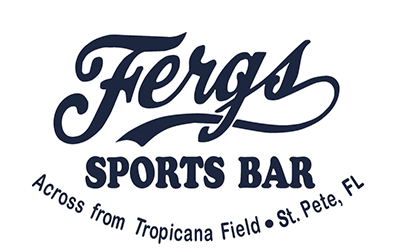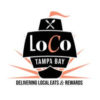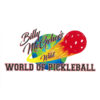ST. PETERSBURG - Ferg's. It's the kind of place where TV news crews flock to find diehard baseball fans for live shots.Where the pocked and scuffed wood-plank floors were ripped out of high school gymnasiums and recycled for a sports pub. Where, if you occupy the same bar stool long enough, you might get a bacon burger named after you.
Over 18 years, Mark "Ferg" Ferguson has built the quintessential downtown sports pub, particularly for Tampa Bay Rays fans exiting the Trop or those without a ticket. But all around him the chatter about the Rays' pennant run includes gossip about their potential relocation out of downtown St. Petersburg. Ferguson insists that his pub can withstand the loss of the Rays if, indeed, they bolt for Tampa or elsewhere. But he's not sitting around waiting. He's hatched a plan to help the Rays sell more season tickets and, hopefully, convince the Rays to stay in downtown, if not at Tropicana Field.Call it Project Ferg. The Trop's sloped dome hovers just over Ferg's back balcony. Off to the side, Ferguson has decorated the balcony with an old metal dinghy hanging from davits and an empty keg tethered to the ceiling. The legs of his outdoor bar stools are made of PVC pipe. Ferguson's put a lot of love into this pub over the years. His story is well known to locals. Now 53, Ferguson was a health and phys-ed teacher at the old Southside Fundamental Middle School in St. Petersburg in 1991 and kept driving past a former Sunoco station in downtown. It was in the shadows of the Trop - then known as the Florida Suncoast Dome - which was painfully, embarrassingly vacant. The city of St. Petersburg had finished building the dome in 1990 after gambling that it could attract Major League Baseball. But it would be five long years before baseball awarded a franchise to the city and three years beyond that until the Devil Rays threw their first pitch.Ferguson saw potential. He put up about $26,000 himself and cobbled together donations of $2,000 to $20,000 from 30 friends, relatives and investors. Ferg's was born. It was just 2,000 square feet at the time, but ever since has been adding additional space here or there until it reached its current form, a 12,000-square-foot patchwork of patios and balconies, 64 televisions, pennants and PVC-pipe stools. Its menu has evolved, too. Among his most cherished offerings: the Bender Burger, named for a former student who died after falling asleep at the wheel; and the Albie Burger, a bacon cheeseburger salute to a former city worker known for his chattiness and his fondness for a seat at Ferg's bar. When Albie died suddenly, 400 people showed up at a makeshift wake. At Ferg's, of course. If the Rays leave downtown, Ferguson knows it will pinch his sports bar. About 40 percent of his business is tied to Rays games. But, he doesn't believe their loss would cripple his business. He made it through the lean years before the then-Devil Rays arrived, and he'll survive now, he says. Downtown St. Petersburg today is teeming with nightlife along Beach Drive, and new apartment buildings are sprouting up a stone's throw from Ferg's. In his gut, Ferguson believes the Rays want to leave downtown St. Pete. He figures they want to be in downtown Tampa or east Tampa near the Florida State Fairgrounds because of Tampa's greater corporate base. Groups of investors have pitched plans for a new ballpark in each of those locations. But if the community could just buy a few thousand more tickets per game, bumping average ticket sales from the current 22,000 per game to 26,000 or so, maybe the Rays wouldn't need to leave. That's where his plan comes in. He wants the team to market tickets specifically to small businesspeople, the lifeblood of the Bay area's business community. Sell upper-level tickets and offer deep discounts for bulk purchases, Ferguson says. Smooth out the per-game variation, so that Yankees games cost the same as Royals games and weekend games cost the same as weekday games. Encourage small businesses to hand them out for free and build goodwill for themselves. "Give them to charities, give them to employees as incentives. It just makes sense to give away tickets," says Ferguson, who says he gives away hundreds of game tickets a year to customers and charities. In fact, corporate support has been a huge problem for the Rays. Major league teams typically sell two-thirds of their tickets to corporations and a third to individuals, according to the ABC Coalition, a group of civic leaders who are pushing for a new stadium for the Rays. That ratio is reversed in the Bay area, which means the team's attendance is less stable than other clubs'. Ferguson has already pitched his idea to the Clutch Hitters, a group of local businessmen who are trying to build corporate support for the Rays. He also plans to take it to the St. Petersburg Area Chamber of Commerce and the St. Petersburg Downtown Partnership. And, of course, he'll approach the Rays. It's not clear the team will play ball. The team issued a short statement in response to a question about Ferguson's plan: "We receive ideas all the time from fans and we appreciate their ideas and respond directly to as many as we can. We are very proud to have recently been voted by ESPN as the third most affordable team among the four major sports and are pleased with our current pricing structure." At the moment, the Rays' cheapest full-season ticket package costs $826 for Upper Reserved-level seats, a team spokesman said. Ferguson's had some positive feedback from small businesses, including some who say they'd jump at the chance to buy discounted upper-deck tickets. "I think it's a great way to build relationships, and it's not that much money to do that," said Mike McKenna, who owns a sporting goods store in Pinellas Park and may buy up to four upper-deck season tickets next year. However, on the Tampa side of the Bay some are not so sure. To Mike Albano, who works for a Tampa defense contractor, the problem with Rays games is not price. It's the distance to Tropicana Field. His firm, SGIS, would consider buying season tickets and distributing them to clients if they didn't have to drive so far on weeknights, Albano said. Ferg is undeterred. To him, just a little spike in attendance could go a long way. "I believe if we can deliver another 4,000 to 5,000 people a game, they'll want to stay right here," he says.
Reporter Michael Sasso can be reached at (813) 259-7865.






